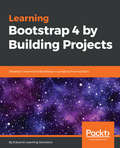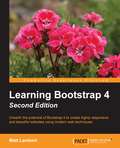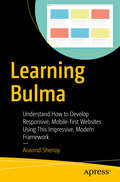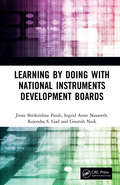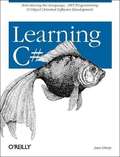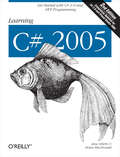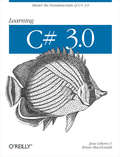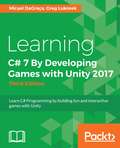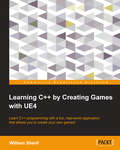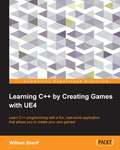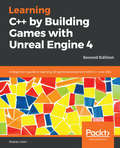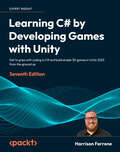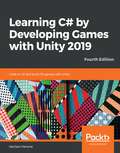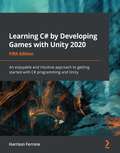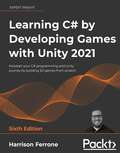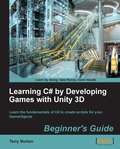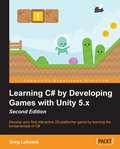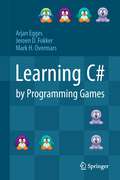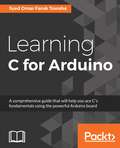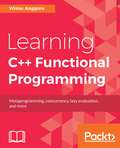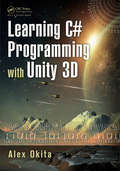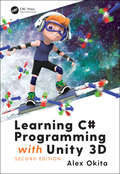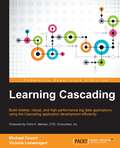- Table View
- List View
Learning Bootstrap 4 by Building Projects: Develop 5 real-world Bootstrap 4.x projects from scratch
by Eduonix Learning SolutionsPractical guide to learning responsive web development with the powerful JavaScript Library, BootstrapKey FeaturesCreate 5 responsive web apps with Bootstrap 4Use elements and full Bootstrap toolkit to construct custom animations and templatesDesign, customize, and create existing UIs and media aggregator appsBook DescriptionBootstrap, the world’s most popular frontend framework, is an open source toolkit for building web applications with HTML, CSS, and JavaScript.Learning Bootstrap 4 by Building Projects covers the essentials of Bootstrap 4 along with best practices. The book begins by introducing you to the latest features of Bootstrap 4. You will learn different elements and components of Bootstrap, such as the strict grid system, Sass, which replaced Less, flexbox, Font Awesome, and cards. As you make your way through the chapters, you will use a template that will help you to build different kinds of real-world websites, such as a social media website, a company landing page, a media hosting website, and a profile page, with ease.By the end of this book, you will have built websites that are visually appealing, responsive, and robust.What you will learnGet familiar with the new features of Bootstrap 4Understand how the new grid system worksLearn to use the Sass tool in BootstrapAutomate your tasks using the task runner, GulpUse Lightbox to build a photo galleryMaster best practices for HTML, CSS, and JavaScriptWho this book is forLearning Bootstrap 4 by Building Projects is for web developers who want to build real-world responsive websites from scratch using Bootstrap 4. Basic knowledge of HTML and CSS is required.
Learning Bootstrap 4 - Second Edition
by Matt LambertUnearth the potential of Bootstrap 4 to create highly responsive and beautiful websites using modern web techniques About This Book * This book shows how to take advantage of the all new features introduced in Bootstrap * Learn responsive web design and discover how to build mobile-ready websites with ease * Find out how to extend the capabilities of Bootstrap with a huge range of tools and plugins, including jQuery, * Do more with JavaScript and learn how to create an enhanced user experience Who This Book Is For If you want to learn to build enterprise-level websites efficiently with Bootstrap, this book is for you. You must have a basic and fundamental understanding of HTML, CSS, and JavaScript; however, there is no need to have prior Bootstrap experience. What You Will Learn * Fire up Bootstrap and set up the required build tools to get started * See how and when to use Flexbox with the Bootstrap layouts * Find out how to make your websites responsive, keeping in mind Mobile First design * Work with content such as tables and figures * Play around with the huge variety of components that Bootstrap offers * Extend your build using plugins developed from JavaScript * Use Sass to customize your existing themes In Detail Bootstrap, the most popular front-end framework built to design elegant, powerful, and responsive interfaces for professional-level web pages has undergone a major overhaul. Bootstrap 4 introduces a wide range of new features that make front-end web design even simpler and exciting. In this gentle and comprehensive book, we'll teach you everything that you need to know to start building websites with Bootstrap 4 in a practical way. You'll learn about build tools such as Node, Grunt, and many others. You'll also discover the principles of mobile-first design in order to ensure your pages can fit any screen size and meet the responsive requirements. Learn to play with Bootstrap's grid system and base CSS to ensure your designs are robust and that your development process is speedy and efficient. Then, you'll find out how you can extend your current build with some cool JavaScript Plugins, and throw in some Sass to spice things up and customize your themes. This book will make sure you're geared up and ready to build amazingly beautiful and responsive websites in a jiffy. Style and approach With the help of several real-world examples and code, this book will teach you to build a full-featured responsive website in Bootstrap, which is mobile-ready.
Learning Bulma: Understand How to Develop Responsive, Mobile-first Websites Using This Impressive, Modern Framework
by Aravind ShenoyLearn to use Bulma in your HTML file by applying easy-to-understand practical examples to create responsive and mobile-first websites.Featuring a step-by-step approach, this book encourages you to modify its code examples and review the changes produced in the output, to thereby reveal the subtle nuances of this awesome utility. Bulma is an impressive, modern framework utility that allows the easy construction of web pages thanks to the highly flexible Flex-box grid styles and simple syntax. You'll see how to use Bulma’s intuitive CSS capabilities to create interactive websites that support responsive design by dynamically adjusting the layout resulting in an optimal viewing experience. You'll then delve into typical modifiers, columns, Flex-box grid styles, forms, elements, utilities, CSS components, and more. By the end of this book, you will be familiar with the inner workings of Bulma at an intermediate level and be equipped to aptly leverage Bulma’s utilities to streamline your web designing experience. What You'll LearnGet started quickly with Bulma Use the grid system, layout, content, and modifiersLeverage Bulma’s built-in CSS utilitiesStreamline the web design experience with Bulma’s flexible attributesEffectively take a mobile-first approachWho This Book Is ForBeginners who have a basic understanding of HTML, CSS and JavaScript.
Learning by Doing with National Instruments Development Boards
by Jivan Shrikrishna Parab Ingrid Anne Nazareth Rajendra S. Gad Gourish NaikLearning by Doing with National Instruments Development Boards starts with a brief introduction to LabVIEW programming, which is required to explore the National Instrument platform, an introduction that includes detailed installation and licensing setup. Further, it gives the features and configuration setup of NI SPEEDY-33, NI ELVIS and myRIO boards. The focus of the book is on worked-out case studies for students working in different areas of electronics such as basic digital design, biomedical instrumentation, sensors and measurement. Data acquisition using SPEEDY-33, NI –ELVIS and myRIO kits is also odiscussed. The book also examines the myRIO platform.
Learning C#
by Jesse LibertyWith Learning C#, best-selling author Jesse Liberty will help you build a solid foundation in .NET and show how to apply your skills by using dozens of tested examples. You will learn how to develop various kinds of applications--including those that work with databases--and web services. Whether you have a little object-oriented programming experience or you are new to programming altogether, Learning C#will set you firmly on your way.
Learning C# 2005
by Brian Macdonald Jesse LibertyIf you're a novice programmer and you want to learn C#, there aren't many books that will guide you. Most C# books are written for experienced C++ and Java programmers. That's why Jesse Liberty, author of the best-selling books Programming C# and Programming ASP.NET , has written an entry-level guide to C#. Written in a warm and friendly manner, Learning C# assumes no prior programming experience, and provides a thorough introduction to Microsoft's premier .NET language. The book helps you build a solid foundation in .NET, and shows you how to apply your skills through the use of dozens of tested examples. You'll learn about the syntax and structure of the C# language, including operators, classes and interfaces, structs, arrays, and strings. Better yet, this updated edition of Learning C# has been completely revised to include the very latest content and teaching techniques. Here's what's new: A detailed explanation of C# 2.0 An introduction to Visual Studio 2005, a tool set for building Windows and web applications More than 200 questions and programming exercises to help you better judge your understanding of the material A greater emphasis on event handling Information on generics and generic collections By the time you've finished Learning C# , you'll be ready to move on to a more advanced programming guide that will help you create large-scale web and Windows applications. Whether you have a little object-oriented programming experience or you are new to programming altogether, Learning C# will set you firmly on your way to mastering the essentials of the C# language.
Learning C# 3.0: Master the fundamentals of C# 3.0
by Jesse Liberty Brian MacdonaldIf you're new to C#, this popular book is the ideal way to get started. Completely revised for the latest version of the language, Learning C# 3.0 starts with the fundamentals and takes you through intermediate and advanced C# features -- including generics, interfaces, delegates, lambda expressions, and LINQ. You'll also learn how to build Windows applications and handle data with C#. No previous programming experience is required -- in fact, if you've never written a line of code in your life, bestselling authors Jesse Liberty and Brian MacDonald will show you how it's done. Each chapter offers a self-contained lesson to help you master key concepts, with plenty of annotated examples, illustrations, and a concise summary. With this book, you will: Learn how to program as you learn C# Grasp the principles of object-oriented programming through C# Discover how to use the latest features in C# 3.0 and the .NET 3.5 Framework--including LINQ and the Windows Presentation Foundation (WPF) Create Windows applications and data-driven applications You'll also find a unique Test Your Knowledge section in each chapter, with practical exercises and review quizzes, so you can practice new skills and test your understanding. If you're ready to dive into C# and .NET programming, this book is a great way to quickly get up to speed.
Learning C# 7 By Developing Games with Unity 2017: Learn C# Programming by building fun and interactive games with Unity
by Predrag Končar Predrag Koncar Micael DaGraçaKey Features This is a step-by-step guide to learn the fundamentals of C# 7 scripting to develop GameObjects and master the basics of the new UI system in Unity Build and develop your 2D game right from scratch while implementing the principles of object-oriented programming and coding in C# 7 Get to grips with the fundamentals of optimizing your game using the latest features of Unity 2017 Book Description Do you want to learn C# programming by creating fun and interactive games using the latest Unity 2017 platform? If so, look no further; this is the right book for you. Get started with programming C# so you can create 2D and 3D games in Unity. We will walk you through the basics to get you started with C# 7 and its latest features. Then, explore the use of C# 7 and its latest functional programming capabilities to create amazing games with Unity 2017. You will create your first C# script for Unity, add objects into it, and learn how to create game elements with it. Work with the latest functional programming features of C# and leverage them for great game scripting. Throughout the book, you will learn to use the new Unity 2017 2D tool set and create an interactive 2D game with it. You will make enemies appear to challenge your player, and discover some optimization techniques for great game performance. At the end, you will learn how to transform a 2D game into 3D, and you will be able to skill up to become a pro C# programmer with Unity 2017! What you will learn Create your first 2D and 3D games in Unity Understand the fundamentals of variables, methods, and code syntax in C# Use loops and collections efficiently in Unity to reduce the amount of code Develop a game using object-oriented programming principles Implement simple enemy characters into the game to learn point-to-point movement and Tree behaviors Avoid performance mistakes by implementing different optimization techniques Export 3D models and animations and import them inside a Unity project
Learning C++ by Creating Games with UE4
by William SherifIf you are really passionate about games and have always wanted to write your own, this book is perfect for you. It will help you get started with programming in C++ and explore the immense functionalities of UE4.
Learning C++ by Creating Games with UE4
by William Sherif<P><P>Learn C++ programming with a fun, real-world application that allows you to create your own games! <P><P>About This Book <P><P>Be a top programmer by being able to visualize programming concepts; how data is saved in computer memory, and how a program flows <P><P>Keep track of player inventory, create monsters, and keep those monsters at bay with basic spell casting by using your C++ programming skills within Unreal Engine 4 <P><P>Understand the C++ programming concepts to create your own games <P><P>Who This Book Is For <P><P>If you are really passionate about games and have always wanted to write your own, this book is perfect for you. It will help you get started with programming in C++ and explore the immense functionalities of UE4. <P><P>What You Will Learn <P><P>Visualize and truly understand C++ programming concepts, such as how data is saved in computer memory and how program flow works <P><P>Write reusable code by grouping lines of code into functions <P><P>Learn how inheritance works-how traits of a base class are passed on to derived classes <P><P>Learn about dynamic allocation of new memory for your program <P><P>Design your own world using the UE4 editor <P><P>Practice programming by coding behaviors into your game world, including player inventory tracking, monsters, and NPCs <P><P>In Detail <P><P>Unreal Engine 4 is used to create top notch, exciting games by AAA studios, and learning to program in C++ needs some serious motivation. <P><P>Learning C++ by Creating Games With UE4 will start with the basics of C++: installing a code editor so you can begin to write C++ code. You will then learn how to write small, self-contained C++ programs that show you how to use the C++ language, without overwhelming you with too much code at the beginning. As we dig into more advanced C++ concepts, you will start to explore the functionality the UE4 engine has to offer. You will use the UE4 editor to create your own world, and then program in some seriously fun gameplay. By the end of this book, you should have a good grasp of how to program in C++.
Learning C++ by Creating Games with Unreal Engine 4 - Second Edition
by Sharan VolinIf you are really passionate about games and have always wanted to write your own, this book is perfect for you. It will help you get started with programming in C++ and explore the immense functionalities of UE4
Learning C# by Developing Games with Unity: Get to grips with coding in C# and build simple 3D games in Unity 2022 from the ground up, 7th Edition
by Harrison FerroneLearn C# programming from scratch using Unity as a fun and accessible entry point with this updated edition of the bestselling series.Includes invitation to join the online Unity Game Development community to read the book alongside peers, Unity developers/C# programmers and Harrison Ferrone.Key FeaturesDevelop a strong foundation of programming concepts and the C# languageBecome confident with Unity fundamentals and features in line with Unity 2022Build a playable game prototype in Unity—a working first-person shooter game prototypeBook DescriptionIt's the ability to write custom C# scripts for behaviors and game mechanics that really takes Unity the extra mile. That's where this book can help you as a new programmer! Harrison Ferrone, in this seventh edition of the bestselling series, will take you through the building blocks of programming and the C# language from scratch while building a fun and playable game prototype in Unity. This book will teach you the fundamentals of OOPs, basic concepts of C#, and Unity engine with lots of code samples, exercises and tips to go beyond the book with your work. You will write C# scripts for simple game mechanics, perform procedural programming, and add complexity to your games by introducing intelligent enemies and damage-dealing projectiles. You will explore the fundamentals of Unity game development, including game design, lighting basics, player movement, camera controls, collisions, and more with every passing chapter. Note: The screenshots in the book display the Unity editor in full-screen mode for a comprehensive view. Users can easily reference color versions of images by downloading them from the GitHub repository or the graphics bundle linked in the book. What you will learnUnderstanding programming fundamentals by breaking them down into their basic partsComprehensive explanations with sample codes of object-oriented programming and how it applies to C#Follow simple steps and examples to create and implement C# scripts in UnityDivide your code into pluggable building blocks using interfaces, abstract classes, and class extensionsGrasp the basics of a game design document and then move on to blocking out your level geometry, adding lighting and a simple object animationCreate basic game mechanics such as player controllers and shooting projectiles using C#Become familiar with stacks, queues, exceptions, error handling, and other core C# conceptsLearn how to handle text, XML, and JSON data to save and load your game dataWho this book is forIf you're a developer, programmer, hobbyist, or anyone who wants to get started with Unity and C# programming in a fun and engaging manner, this book is for you. You'll still be able to follow along if you don't have programming experience, but knowing the basics will help you get the most out of this book.
Learning C# by Developing Games with Unity 2019: Code in C# and build 3D games with Unity, 4th Edition
by Harrison FerroneUnderstand the fundamentals of C# programming and get started with coding from ground up in an engaging and practical manner Key Features Beginner's guide to getting started with software development concepts from a macro level Leverage the power of the latest C# in solving the complex programming problems Learn to script and customize your 3D games and implement animation techniques to make them engaging Book Description Learning to program in today's technical landscape can be a daunting task, especially when faced with the sheer number of languages you have to choose from. Luckily, Learning C# with Unity 2019 removes the guesswork and starts you off on the path to becoming a confident, and competent, programmer using game development with Unity. You'll start off small by learning the building blocks of programming, from variables, methods, and conditional statements to classes and object-oriented systems. After you have the basics under your belt you'll explore the Unity interface, creating C# scripts, and translating your newfound knowledge into simple game mechanics. Throughout this journey, you'll get hands-on experience with programming best practices and macro-level topics such as manager classes and flexible application architecture. By the end of the book, you'll be familiar with intermediate C# topics like generics, delegates, and events, setting you up to take on projects of your own. What you will learn Understand programming fundamentals with practice examples in C# Explore the interface and features of Unity 2019 Learn C# programming syntax from scratch Create a game design document and prototype level Explore intermediate programming topics and best practices Implement game mechanics, interactions, and UI elements with C# Who this book is for The book caters to developers and programmers who want to get started with C# programming in a fun and engaging manner. Anyone who wants to build games and script in C# language and Unity can take this book up. No prior programming or Unity experience is required.
Learning C# by Developing Games with Unity 2020 - Fifth Edition: An Enjoyable And Intuitive Approach To Getting Started With C# Programming And Unity
by Harrison FerroneIf you’re a developer, programmer, or anyone who wants to get started with C# programming in a fun and engaging manner, this book is for you. It’ll show you how to use the C# language and Unity to create games and scripts. Prior experience in programming or Unity is not required.
Learning C# by Developing Games with Unity 2021: Kickstart your C# programming and Unity journey by building 3D games from scratch, 6th Edition
by Harrison FerroneLearn C# programming from scratch using Unity as a fun and accessible entry point with this updated edition of the bestselling seriesKey FeaturesLearn C# programming basics, terminology, and coding best practicesBecome confident with Unity fundamentals and features in line with Unity 2021Apply your C# knowledge in practice and build a working first-person shooter game prototype in UnityBook DescriptionThe Learning C# by Developing Games with Unity series has established itself as a popular choice for getting up to speed with C#, a powerful and versatile programming language with a wide array of applications in various domains. This bestselling franchise presents a clear path for learning C# programming from the ground up through the world of Unity game development.This sixth edition has been updated to introduce modern C# features with Unity 2021. A new chapter has also been added that covers reading and writing binary data from files, which will help you become proficient in handling errors and asynchronous operations.The book acquaints you with the core concepts of programming in C#, including variables, classes, and object-oriented programming. You will explore the fundamentals of Unity game development, including game design, lighting basics, player movement, camera controls, and collisions. You will write C# scripts for simple game mechanics, perform procedural programming, and add complexity to your games by introducing smart enemies and damage-causing projectiles.By the end of the book, you will have developed the skills to become proficient in C# programming and built a playable game prototype with the Unity game engine.What you will learnFollow simple steps and examples to create and implement C# scripts in UnityDevelop a 3D mindset to build games that come to lifeCreate basic game mechanics such as player controllers and shooting projectiles using C#Divide your code into pluggable building blocks using interfaces, abstract classes, and class extensionsBecome familiar with stacks, queues, exceptions, error handling, and other core C# conceptsLearn how to handle text, XML, and JSON data to save and load your game dataExplore the basics of AI for games and implement them to control enemy behaviorWho this book is forIf you're a developer, programmer, hobbyist, or anyone who wants to get started with C# programming in a fun and engaging manner, this book is for you. Prospective Unity game developers will also find this title useful. No prior experience in programming or Unity required.
Learning C# by Developing Games with Unity 3D Beginner's Guide
by Terry NortonThis book uses the learning-by-example approach. It takes simple examples from games to introduce all the main concepts of programming in an easy-to-digest and immediately recognizable way.This book is for the total beginner to any type of programming, focusing on the writing of C# code and scripts only. There are many parts that make up the Unity game engine. It is assumed that the reader already knows their way around Unity's user interface. The code editor used in this book is the MonoDevelop editor supplied by Unity.
Learning C# by Developing Games with Unity 5.x - Second Edition
by Greg LukosekDevelop your first interactive 2D platformer game by learning the fundamentals of C# About This Book * Get to grips with the fundamentals of scripting in C# with Unity * Create an awesome, 2D platformer game from scratch using the principles of object-oriented programming and coding in C# * This is a step-by-step guide to learn the fundamentals of C# scripting to develop GameObjects and master the basics of the new UI system in Unity Who This Book Is For The book is targeted at beginner level Unity developers with no programming experience. If you are a Unity developer and you wish to learn how to write C# scripts and code by creating games, then this book is for you. What You Will Learn * Understand the fundamentals of variables, methods, and code syntax in C# * Get to know about techniques to turn your game idea into working project * Use loops and collections efficiently in Unity to reduce the amount of code * Develop a game using the object-oriented programming principles * Generate infinite levels for your game * Create and code a good-looking functional UI system for your game * Publish and share your game with users In Detail Unity is a cross-platform game engine that is used to develop 2D and 3D video games. Unity 5 is the latest version, released in March 2015, and adds a real-time global illumination to the games, and its powerful new features help to improve a game's efficiency. This book will get you started with programming behaviors in C# so you can create 2D games in Unity. You will begin by installing Unity and learning about its features, followed by creating a C# script. We will then deal with topics such as unity scripting for you to understand how codes work so you can create and use C# variables and methods. Moving forward, you will find out how to create, store, and retrieve data from collection of objects. You will also develop an understanding of loops and their use, and you'll perform object-oriented programming. This will help you to turn your idea into a ready-to-code project and set up a Unity project for production. Finally, you will discover how to create the GameManager class to manage the game play loop, generate game levels, and develop a simple UI for the game. By the end of this book, you will have mastered the art of applying C# in Unity. Style and approach This is a step-by-step guide to developing a game from scratch by applying the fundamentals of C# and Unity scripting.
Learning C# by Programming Games
by Mark H. Overmars Jeroen D. Fokker Arjan EggesC# is the language of choice for learning how to program. It is a very well structured object-oriented language and avoids some of the problems of Java. An excellent free programming environment is available for C#, as well as a game programming framework. And (if necessary) moving from C# to C++ is easy. Developing computer games is a perfect way to learn how to program in modern programming languages. This book teaches how to program in C# through the creation of computer games - and without requiring any previous programming experience. Contrary to most programming books, Egges, Fokker and Overmars do not organize the presentation according to programming language constructs, but instead use the structure and elements of computer games as a framework. For instance, there are chapters on dealing with player input, game objects, game worlds, game states, levels, animation, physics, and intelligence. The reader will be guided through the development of four games showing the various aspects of game development. Starting with a simple shooting game, the authors move on to puzzle games consisting of multiple levels, and conclude the book by developing a full-fledged platform game with animation, game physics, and intelligent enemies. They show a number of commonly used techniques in games, such as drawing layers of sprites, rotating, scaling and animating sprites, showing a heads-up display, dealing with physics, handling interaction between game objects, and creating pleasing visual effects such as snow or glitter. At the same time, they provide a thorough introduction to C# and object-oriented programming, introducing step by step important aspects of programming in general, including many programming constructs and idioms, syntax diagrams, collections, and exception handling. The book is also designed to be used as a basis for a game-oriented programming course. For each part, there are concluding exercises and challenges, which are generally more complex programming endeavors. Lots of supplementary materials for organizing such a course are available on the accompanying web site http://www.csharpprogramminggames.com, including installation instructions, solutions to the exercises, software installation instructions, game sprites and sounds.
Learning C for Arduino
by Syed Omar TowahaUltimate guide for programming Arduino with C About This Book • Get hands-on experience with the Ardruino board and learn to control it with your programming skills • Learn the essential concepts of C such as variables, data structures, functions, loops, and pointers • Work with electronic devices such as LEDs, switches, and motors and connect them to Arduino using C Who This Book Is For This book is for hobbyists who have no knowledge about programming and microcontrollers, but are keen to learn C programming using a very affordable hardware device. What You Will Learn • Play with mathematical operations using C • Use logical operations and loops to play with LEDs and the Arduino board • Create custom functions using C and connect an SD card to the Arduino • Use Object-oriented Programming to connect a GSM module to the Arduino board • Play with an LCD board and Servo using standard Arduino libraries • Build projects using Arduino such as a LED cube, a smart weather system, and home security • Identify and fix common errors on an Arduino board In Detail This book will start with the fundamentals of C programming and programming topics, such data types, functions, decision making, program loops, pointers, and structures, with the help of an Arduino board. Then you will get acquainted with Arduino interactions with sensors, LEDs, and autonomous systems and setting up the Arduino environment. Moving on you will also learn how to work on the digital and analog I/O, establish serial communications with autonomous systems, and integrate with electronic devices. By the end of the book, you will be able to make basic projects such as LED cube and smart weather system that leverages C. Style and approach This comprehensive step-by-step guide starts with the basic concepts of C for your Arduino board. It will teach you how to leverage C to explore the capabilities of Arduino.
Learning C++ Functional Programming
by Wisnu AnggoroApply Functional Programming techniques to C++ to build highly modular, testable, and reusable code About This Book • Modularize your applications and make them highly reusable and testable • Get familiar with complex concepts such as metaprogramming, concurrency, and immutability • A highly practical guide to building functional code in C++ filled with lots of examples and real-world use cases Who This Book Is For This book is for C++ developers comfortable with OOP who are interested in learning how to apply the functional paradigm to create robust and testable apps. What You Will Learn • Get to know the difference between imperative and functional approaches • See the use of first-class functions and pure functions in a functional style • Discover various techniques to apply immutable state to avoid side effects • Design a recursive algorithm effectively • Create faster programs using lazy evaluation • Structure code using design patterns to make the design process easier • Use concurrency techniques to develop responsive software • Learn how to use the C++ Standard Template Library and metaprogramming in a functional way to improve code optimization In Detail Functional programming allows developers to divide programs into smaller, reusable components that ease the creation, testing, and maintenance of software as a whole. Combined with the power of C++, you can develop robust and scalable applications that fulfill modern day software requirements. This book will help you discover all the C++ 17 features that can be applied to build software in a functional way. The book is divided into three modules—the first introduces the fundamentals of functional programming and how it is supported by modern C++. The second module explains how to efficiently implement C++ features such as pure functions and immutable states to build robust applications. The last module describes how to achieve concurrency and apply design patterns to enhance your application's performance. Here, you will also learn to optimize code using metaprogramming in a functional way. By the end of the book, you will be familiar with the functional approach of programming and will be able to use these techniques on a daily basis. Style and approach This book uses a module-based approach, where each module will cover important aspects of functional programming in C++ and will help you develop efficient and robust applications through gaining a practical understanding.
Learning C# Programming with Unity 3D
by Alex OkitaDesigned to give you enough familiarity in a programming language to be immediately productive, Learning C# Programming with Unity 3D provides the basics of programming and brings you quickly up to speed. Organized into easy-to-follow lessons, the book covers how C# is used to make a game in Unity3D. After reading this book, you will be armed with
Learning C# Programming with Unity 3D, second edition
by Alex OkitaLearning C# Programming with Unity 3D, Second Edition is for the novice game programmer without any prior programming experience. Readers will learn how C# is used to make a game in Unity 3D. Many example projects provide working code to learn from and experiment with. As C# evolves, Unity 3D evolves along with it. Many new features and aspects of C# are included and explained. Common programming tasks are taught by way of making working game mechanics. The reader will understand how to read and apply C# in Unity 3D and apply that knowledge to other development environments that use C#. New to this edition: includes latest C# language features and useful tools included with the .NET library like LINQ, Local Functions Tuples, and more! Key Features Provides a starting point for the first-time programmer C# Code examples are simple short and clear Learn the very basics on up to interesting tricks which C# offers
Learning Carbon
by Apple ComputerLearning Carbon is designed to get you programming right away in Carbon, one of two APIs (Application Programmer Interfaces) Macintosh programmers can use to write applications that run native in Mac OS X. Using Carbon, you don't have to rewrite your Mac OS programs entirely to get them to take advantage of the new features in Mac OS X. Instead, all you have to rewrite is the 10 to 20 percent of the code that can't be translated to OS X. For C programmers, Apple's Carbon is the essential building block for applications on Mac OS X. With Carbon, you can use simple, traditional C interfaces to create world-class applications for a world-class operating system. After orienting you with a detailed tour of a Carbon application, Learning Carbon walks you through the entire process of designing and creating a complete Carbon application called Moon Travel Planner. Along the way, you'll be introduced to two pivotal development tools: Project Builder and Interface Builder. You'll learn key concepts about Carbon and Mac OS X programming, including event management, resource handling, and bundle anatomy. And you'll get direct, hands-on instruction on how to implement essential application tasks, such as managing windows, printing documents, opening and saving files, creating and responding to menu commands, providing user help, and organizing your application for easy localization in multiple countries and languages. After finishing this book, you'll be ready to start writing your own Carbon applications. Written by Apple insiders with access to engineers deeply involved in creating Mac OS X, Learning Carbon brings you information that's not available anywhere else, to get you in on the ground floor of the exciting new Mac OS X application development market.
Learning Carbon
by Apple Computer Red Hat Inc.Get up to speed quickly on creating Mac OS X applications with Carbon™. You'll learn the fundamentals and key concepts of Carbon programming as you design and build a complete application under the book's guidance. Written by insiders at Apple Computer, Learning Carbon provides information you can't get anywhere else, giving you a head start in the Mac OS X application development market.
Learning Cascading
by Victoria Loewengart Michael CovertThis book is intended for software developers, system architects and analysts, big data project managers, and data scientists who wish to deploy big data solutions using the Cascading framework. You must have a basic understanding of the big data paradigm and should be familiar with Java development techniques.
